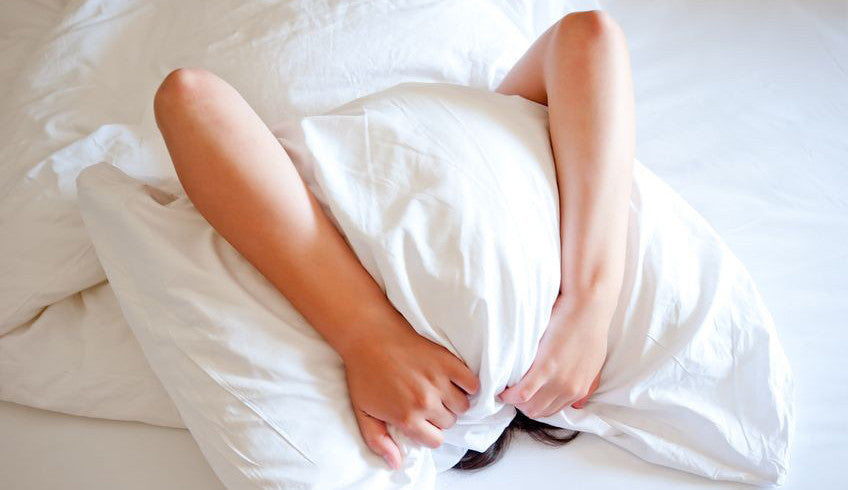
It was 2am and I was lying in bed wide-awake. I couldn’t get comfortable. I couldn’t settle my mind. I felt agitated and restless with thoughts about my ruined day ahead plaguing me. How on earth was I going to function?
Part of my concern was that I couldn’t identify the source of my insomnia. I wasn’t especially worried about anything and I’d performed my usual bedtime ritual – no bright overhead lights after dark (only lamps), meditation, herbal tea… the works. So why couldn’t I sleep? I was confused because while I’ve suffered my fair share of sleepless nights in the past, insomnia hasn’t been a problem for me lately.
Having been diagnosed with an autoimmune disease and knowing that sleep deprivation may not only be one of the causes of my illness but that it also exacerbated my symptoms, I’d come to understand the critical importance of sleep when it comes to my health. I’m highly aware of the latest research showing that regularly getting less than seven hours of sleep each night has wide ranging negative effects on the cardiovascular, endocrine, immune, and nervous systems. Sleep deprivation has been linked to obesity, diabetes, heart disease, anxiety and depression.
With all this in mind, I’m careful to follow the abundance of expert advice on how to get more sleep. One of the major changes I made was to drastically reduce screen time at night because research shows that blue light exposure suppresses the production of melatonin, the hormone that controls sleep and wake cycles. I also realized that even though I enjoyed the shows I was watching, some of them sent my stress levels through the roof. There are only so many zombie attacks and royal conspiracies one can take after a long day at work. So my evening TV time is virtually zip these days. Most nights I shoot for 9:30pm bed time and 10:00pm lights out. Boring I know, but oh so necessary.
So, on this particular sleepless night, having ticked all the boxes… what was going on? I decided to revert to an old trick of performing my bedtime ritual again. I took a warm shower, brushed my teeth and sat down to meditate. At that point I was mentally wiped so trying to practice a focused awareness exercise was like trying to get my toddler son into the bath after playing with his blocks. Not going to happen. Nevertheless I attempted twenty deep, focused breaths and each time my mind wandered, I gently brought it back to the count.
Afterwards I felt much calmer, more centered and peaceful. A mental shift had happened. What did it matter if I couldn’t sleep? No big deal. I just wouldn’t push myself too hard during the approaching workday. And then, like one of those cliche light bulb moments people describe when they realize something obvious, I worked out why I was having trouble sleeping. Caffeine.
I am not a coffee drinker. I gave it up years ago but occasionally have a homemade quarter-cup. That morning a well-meaning colleague had handed me a store bought cappuccino in a friendly gesture to start our day. It smelled delicious. I didn’t think twice and thoroughly enjoyed the buzz and focused high that followed. As the day progressed into the afternoon I started to feel jittery, though by then I’d completely forgotten about my coffee and wondered why I was feeling off.
There’s a great book written by an Australian sleep expert, Dr Carmel Harrington called The Complete Guide to a Good Night’s Sleep, in which she talks about the importance of realizing that there are many different causes of insomnia and there is no one-size-fits-all sleep solution. There might be many reasons you’re not able to get to sleep, stay asleep, or sleep deeply and those things - from anxiety, to out-of-whack circadian rhythms, to chemical induced stimulation - may all be interacting. In my case on this particular night, the problem started with caffeine and one thing led to another until I wound up sleepless at 2am.
The stimulant effects of caffeine work by blocking an important sleep chemical called adenosine, which builds up in our body all day long. From the moment we wake up, the adenosine levels in our brain accumulate until we eventually succumb to sleep. While we are asleep this chemical is not produced so the longer we sleep, the lower the levels of adenosine and the more refreshed we feel in the morning.
Caffeine can fool the brain into thinking there are low levels of the sleep chemical, which is why it helps to pick us up after a rough night. But if we’re still under the influence of caffeine when we go to bed, we may have trouble initiating sleep. Over time we can build up a caffeine tolerance and while we all metabolize caffeine differently, this study showed that caffeine consumed even 6 hours before bedtime could significantly disrupt sleep and this study showed that the equivalent of two cups of coffee at 7:10am in the morning could disrupt sleep efficiency and duration.
I seem to be a particularly sensitive sod when it comes to caffeine and needless to say I’ve been careful not to repeat my mistake, as delicious as that friendly soy cappuccino was. I’ve slept well most nights since except for those involving a certain restless or sick toddler, but the health impact of parenting a young child is another topic for another post.





 My Year of Living Mindfully (DVD)
My Year of Living Mindfully (DVD) The Connection (DOWNLOAD-TO-OWN)
The Connection (DOWNLOAD-TO-OWN) My Year Of Living Mindfully - Book
My Year Of Living Mindfully - Book




